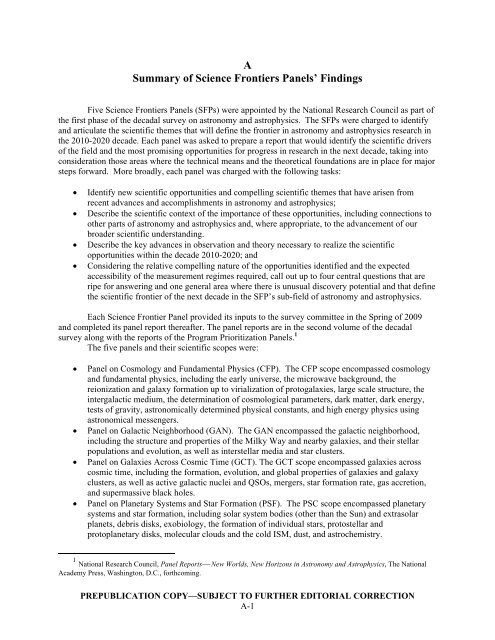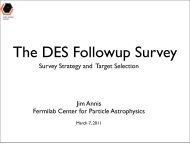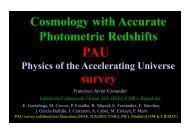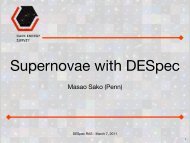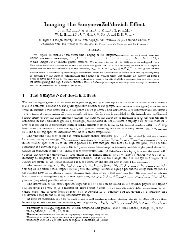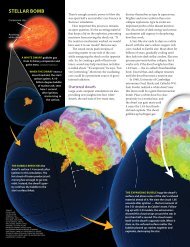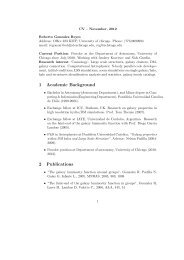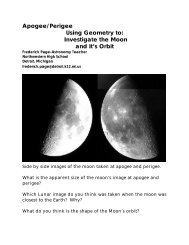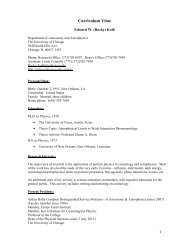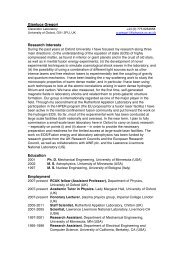prepublication copy - The Department of Astronomy & Astrophysics ...
prepublication copy - The Department of Astronomy & Astrophysics ...
prepublication copy - The Department of Astronomy & Astrophysics ...
You also want an ePaper? Increase the reach of your titles
YUMPU automatically turns print PDFs into web optimized ePapers that Google loves.
A<br />
Summary <strong>of</strong> Science Frontiers Panels’ Findings<br />
Five Science Frontiers Panels (SFPs) were appointed by the National Research Council as part <strong>of</strong><br />
the first phase <strong>of</strong> the decadal survey on astronomy and astrophysics. <strong>The</strong> SFPs were charged to identify<br />
and articulate the scientific themes that will define the frontier in astronomy and astrophysics research in<br />
the 2010-2020 decade. Each panel was asked to prepare a report that would identify the scientific drivers<br />
<strong>of</strong> the field and the most promising opportunities for progress in research in the next decade, taking into<br />
consideration those areas where the technical means and the theoretical foundations are in place for major<br />
steps forward. More broadly, each panel was charged with the following tasks:<br />
• Identify new scientific opportunities and compelling scientific themes that have arisen from<br />
recent advances and accomplishments in astronomy and astrophysics;<br />
• Describe the scientific context <strong>of</strong> the importance <strong>of</strong> these opportunities, including connections to<br />
other parts <strong>of</strong> astronomy and astrophysics and, where appropriate, to the advancement <strong>of</strong> our<br />
broader scientific understanding.<br />
• Describe the key advances in observation and theory necessary to realize the scientific<br />
opportunities within the decade 2010-2020; and<br />
• Considering the relative compelling nature <strong>of</strong> the opportunities identified and the expected<br />
accessibility <strong>of</strong> the measurement regimes required, call out up to four central questions that are<br />
ripe for answering and one general area where there is unusual discovery potential and that define<br />
the scientific frontier <strong>of</strong> the next decade in the SFP’s sub-field <strong>of</strong> astronomy and astrophysics.<br />
Each Science Frontier Panel provided its inputs to the survey committee in the Spring <strong>of</strong> 2009<br />
and completed its panel report thereafter. <strong>The</strong> panel reports are in the second volume <strong>of</strong> the decadal<br />
survey along with the reports <strong>of</strong> the Program Prioritization Panels. 1<br />
<strong>The</strong> five panels and their scientific scopes were:<br />
• Panel on Cosmology and Fundamental Physics (CFP). <strong>The</strong> CFP scope encompassed cosmology<br />
and fundamental physics, including the early universe, the microwave background, the<br />
reionization and galaxy formation up to virialization <strong>of</strong> protogalaxies, large scale structure, the<br />
intergalactic medium, the determination <strong>of</strong> cosmological parameters, dark matter, dark energy,<br />
tests <strong>of</strong> gravity, astronomically determined physical constants, and high energy physics using<br />
astronomical messengers.<br />
• Panel on Galactic Neighborhood (GAN). <strong>The</strong> GAN encompassed the galactic neighborhood,<br />
including the structure and properties <strong>of</strong> the Milky Way and nearby galaxies, and their stellar<br />
populations and evolution, as well as interstellar media and star clusters.<br />
• Panel on Galaxies Across Cosmic Time (GCT). <strong>The</strong> GCT scope encompassed galaxies across<br />
cosmic time, including the formation, evolution, and global properties <strong>of</strong> galaxies and galaxy<br />
clusters, as well as active galactic nuclei and QSOs, mergers, star formation rate, gas accretion,<br />
and supermassive black holes.<br />
• Panel on Planetary Systems and Star Formation (PSF). <strong>The</strong> PSC scope encompassed planetary<br />
systems and star formation, including solar system bodies (other than the Sun) and extrasolar<br />
planets, debris disks, exobiology, the formation <strong>of</strong> individual stars, protostellar and<br />
protoplanetary disks, molecular clouds and the cold ISM, dust, and astrochemistry.<br />
1 National Research Council, Panel Reports⎯ New Worlds, New Horizons in <strong>Astronomy</strong> and <strong>Astrophysics</strong>, <strong>The</strong> National<br />
Academy Press, Washington, D.C., forthcoming.<br />
PREPUBLICATION COPY—SUBJECT TO FURTHER EDITORIAL CORRECTION<br />
A-1


